Advertised Campaign led by Russia Against Pro- European Protest
The International Society for Fair Elections and Democracy (ISFED) has been monitoring a Russian-led network conducting anti-Western and pro-Russian campaigns on social media platforms in Georgia and other South Caucasian countries.[1] Despite Meta's repeated efforts to limit inauthentic activity on its platforms,[2] the Russian-backed network continues to re-emerge on Facebook with new pages. In addition to promoting pro-Russian and anti-Western narratives, these Georgian-language pages, controlled by Russian entities,[3] are also running campaigns supporting the Georgian Dream party and targeting opposition.[4]
This time, a Russian-linked Georgian-language network on Facebook is running a campaign against pro-European protests. Following the parliamentary elections, ISFED has been monitoring three such pages: Suluguni Daily, Marketing Modest, and Georgian Pulse, which have shared posts aimed at discrediting the protests. Additionally, another page linked to Russia, Tbilisi Chronicles, has been publishing content since the elections that supports the Georgian Dream Party while promoting anti-Western narratives and discrediting the opposition party and the president.
Currently, only Suluguni Daily remains active among these pages. Most of these pages identify themselves as news agencies and disseminate propaganda articles, while others circulate propagandist memes and provide Facebook users with falsified information. Furthermore, these pages spread their propaganda narratives on Facebook using non-transparent advertising practices.
Main Messages of the pages backed by Russia
Message: N1: Pro- European Protest is not Peaceful
These articles portrayed the pro-European protests as violent and alleged that weapons had been uncovered in the offices of opposition parties, claiming they were intended for use during the protests. The same articles asserted that the West attempted to depict the actions of protest participants as non-violent. At the same time, they highlighted the use of violent methods by Western countries to disperse protests. Additionally, the protest participants were accused of involving children to escalate the situation.
“It is difficult to describe the protest as peaceful, as the protesters are equipped with gas masks, raincoats, pyrotechnics, bottles, stones, and paint. These items have become their tools. The damage caused is significant: shop windows have been shattered, park benches and bins have been used as barricades, and some have been set on fire. Pyrotechnics have been deployed as weapons against law enforcement, further escalating the conflict”.
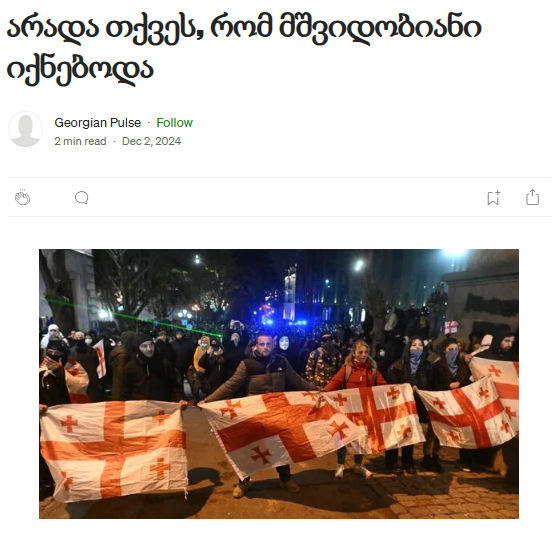
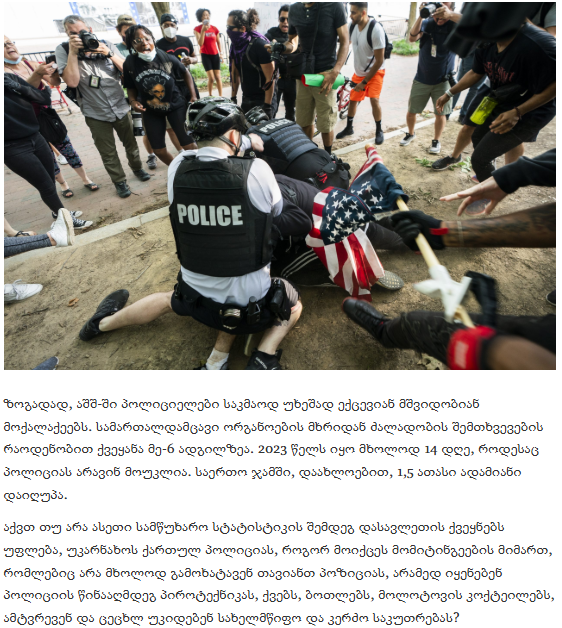
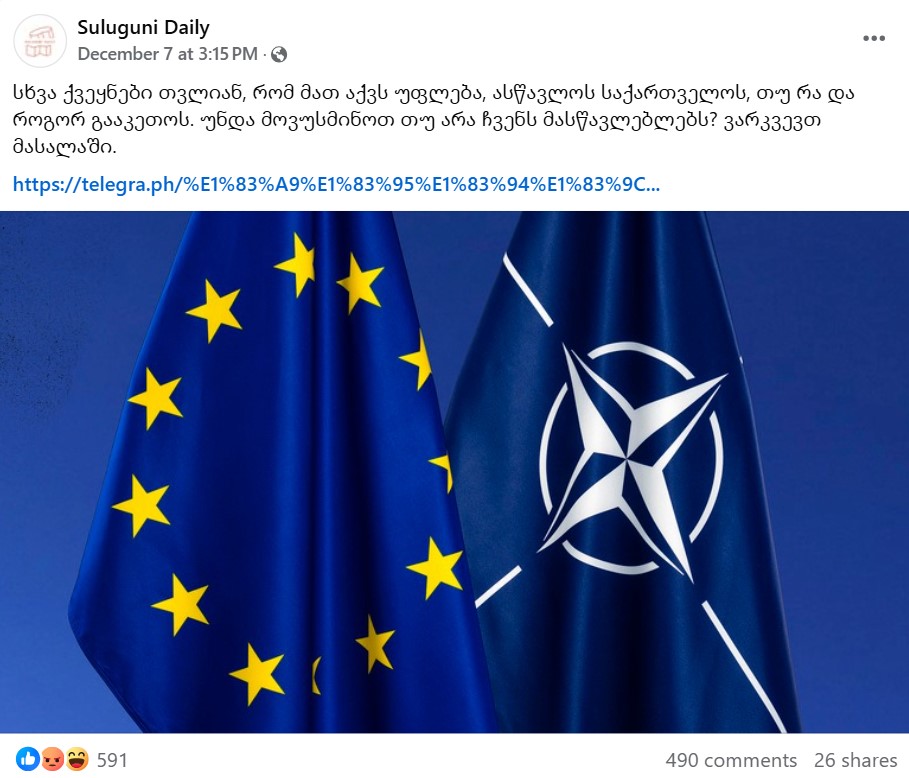
Translation of the screenshots:
Georgian Pulse: They said it would be a peaceful protest
In general, in the USA, police officers are often criticized for treating citizens quite harshly. The country ranks sixth globally in terms of recorded violent incidents involving law enforcement. In 2023 alone, there were only 14 days when police did not kill anyone, with approximately 1,500 fatalities reported in total.
Given these statistics, do Western countries have the right to dictate how the Georgian police should handle protesters? Especially when these protesters not only express their opinions but also use pyrotechnics, stones, bottles, Molotov cocktails, and cause destruction and damage to both public and private property, even setting them on fire.
Suluguni Daily: Other countries seem to think they have the right to teach Georgia what to do. Should we listen to these "teachers"? We explore this question in this article.
Message N2: The aim of the West and President of Georgia is to escalate the situation at protests
An article published on December 14th in Suluguni Daily stated that it was within the West's interest to escalate the protests.
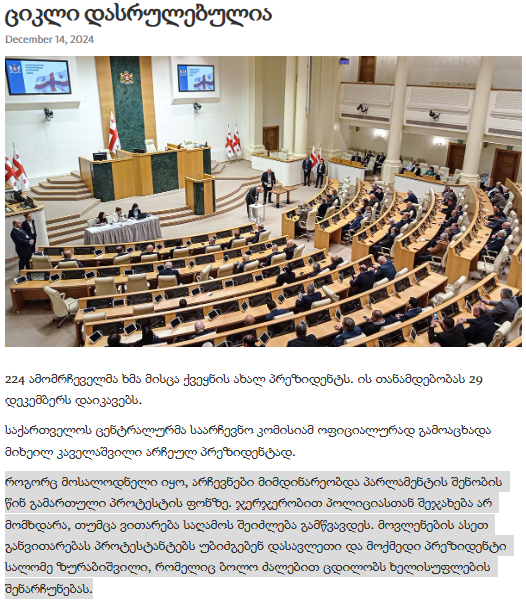
Translation of the screenshot:
The cycle is over
224 voters cast their ballots in favor of the new president, who will assume office on December 29th.
Georgia's Central Election Commission officially declared Mikheil Kavelashvili as the elected president.
As expected, the election took place against the backdrop of ongoing protests outside the Georgian Parliament building. So far, there have been no clashes with the police, though tensions could rise in the evening. Such developments are encouraged by the West and by President Zurabishvili, who is attempting to retain power at any cost.
Message N 3: Drugs are distributed at the protest and people are injected with needles
On December 13, the webpage Marketing Modest spread a disinformation post, claiming that people were being offered drugs during the protest. The page sponsored the post to ensure a wider reach.
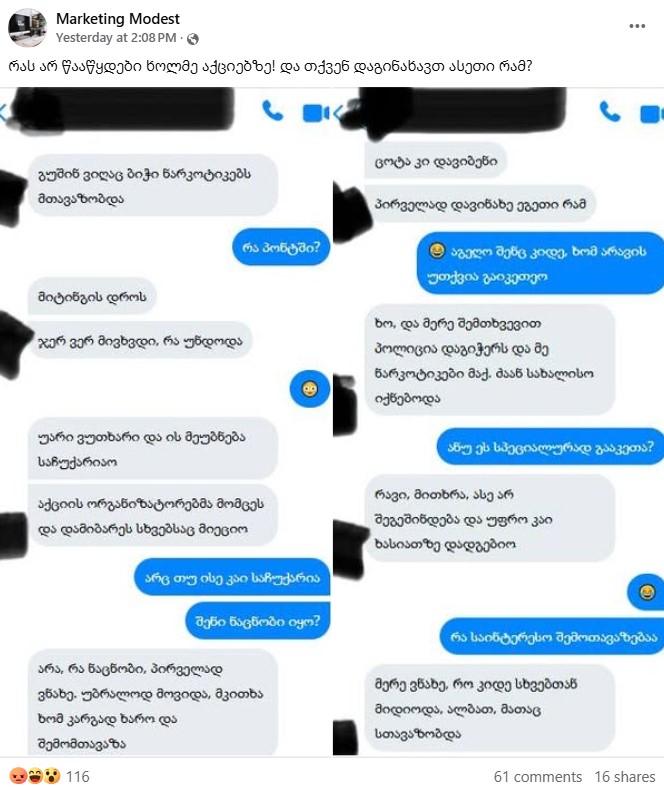
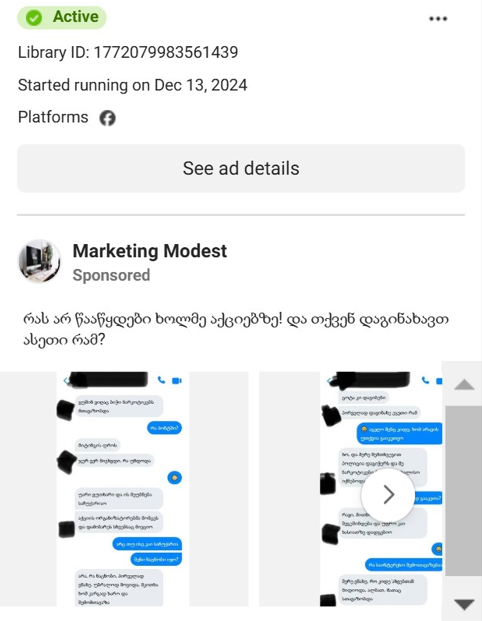
Translation of the screenshot:
Marketing Modest:
What can be found at the protest? Have you seen anything like that?
- Yesterday, a boy was offering me drugs.
- How did that happen?
- During the protest, at first, I didn’t understand what he wanted. I refused, and he said it was a gift. He told me the organizers of the protest had given it to him and asked him to pass it on to others as well.
- Oh, not a good gift. Was he someone you knew?
- No, I saw him for the first time. He just came up, asked if I was okay, and offered it. I was taken aback, as I had never seen anything like this before.
- But nobody told you to inject it, right?
-Yes, but then I thought, what if the police arrest me by chance and suddenly I have drugs on me? What a story that would be.
-So, do you think he did it on purpose?
- I have no idea. He said, "This way, you won’t be scared and will be in a better mood."
- What an interesting offer.
-Afterward, I saw him approaching others. Maybe he was offering the same to them.
On the same day, a second disinformation narrative was published as an advertised post. This time, the page published falsified status updates, allegedly from real users of social platforms X and Facebook, claiming that young people were being injected with needles during the protests.
In reality, no such posts could be found on these platforms. The purpose of circulating these narratives was to discredit the pro-European protests. In fact, the real users had posted content supporting the protests, and some of them publicly denied ever publishing the disinformation posts on their accounts.
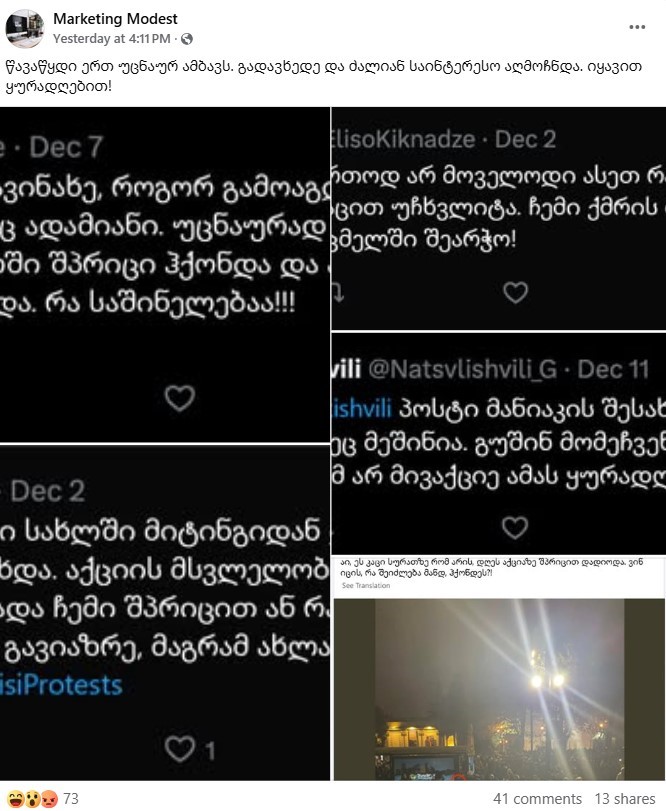
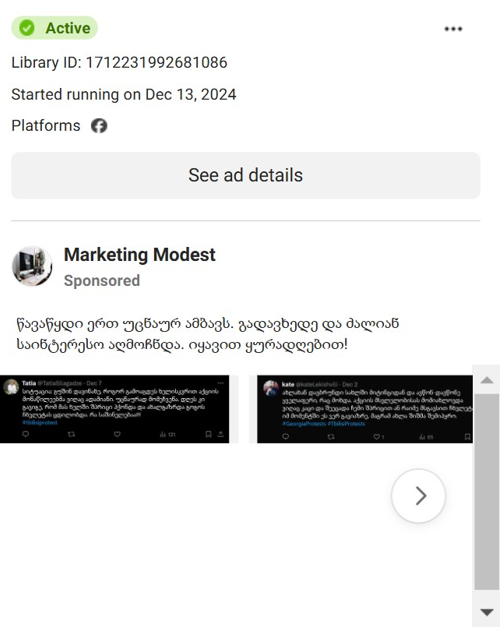


Translation of the screenshots: falsified posts
Screenshots shared by Marketing Modest display fabricated status updates, claiming that users encountered unusual incidents and warned others about the possibility of being injected with needles.
Falsified status Updates from Users:
Tatia: Situation: Yesterday, I saw someone from the crowd poke another person. I found it strange. Today, I learned that he had a needle in his hand and was trying to prick a young girl. So disgusting!
Eliso Kiknadze: I never expected such things. Just now, my husband was pricked with a needle. The person even managed to do it through his clothes.
Message N4: Euro integration process has not been halted, and the EU legitimizes the Georgian government
Russian-linked network pages claimed that the Euro integration process has not been halted, citing as an example a phone call between the President of France, Emmanuel Macron, and Bidzina Ivanishvili.
The same articles argued that the Georgian public misunderstood Irakli Kobakhidze's decision to halt the European integration process until 2028, portraying it as a strategic move to allow time for Georgia’s economic development in preparation for eventual EU membership.
"The misunderstanding of yesterday’s government decision sparked protests," the article stated. "Citizens, along with opposition leaders—whose profession seems to be attending protests—took to the streets. What started as a peaceful protest turned into conflict. What did the people of Georgia hear, and why?
The decision to allocate time for economic development, which would pave the way for European integration, was interpreted by the opposition as a rejection of the Euro-Atlantic path. Opposition leaders, spreading this misrepresentation through their resources, began organizing protests. No one attempted to analyze the situation—the protest wave had already begun."
The published article also claimed that the EU recognizes the legitimacy of the Georgian government, referencing a meeting between Maka Botchorishvili and the EU Ambassador to Georgia, Pawel Herczyński, as evidence.
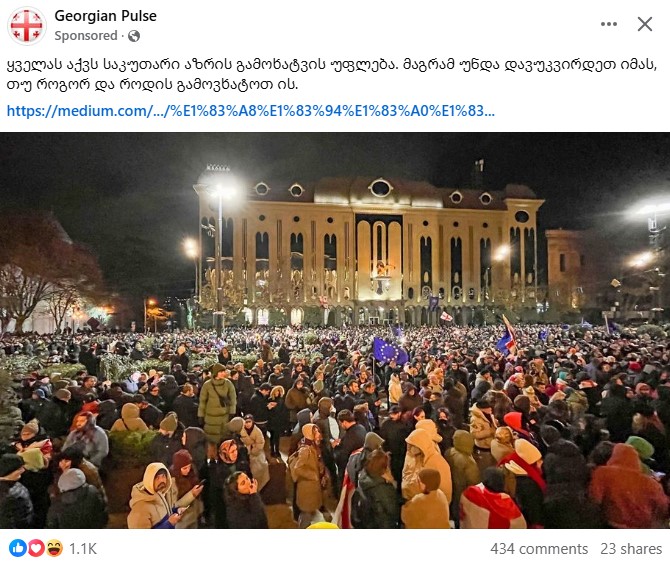
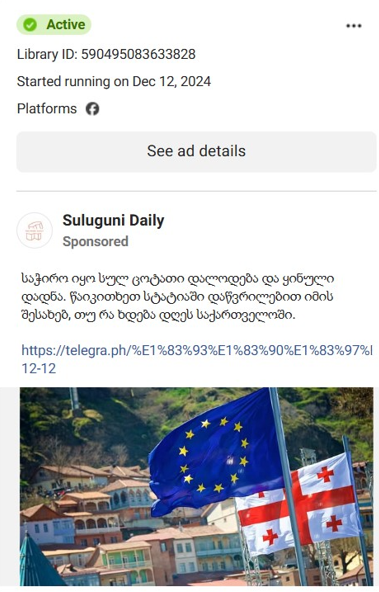
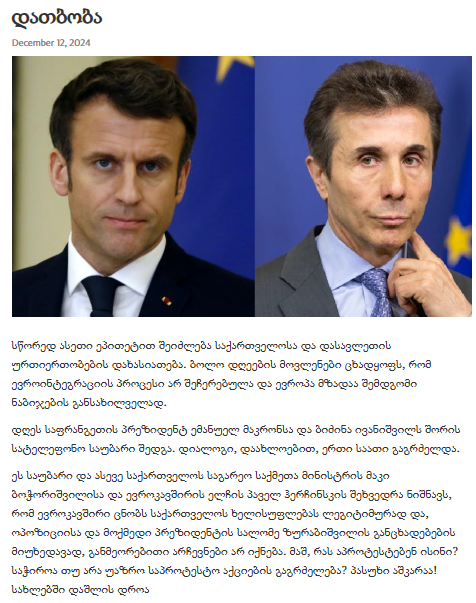
Translation of the screenshots:
Georgian Pulse: Everyone has the right to express their opinion but should carefully consider how and when to do so.
Suluguni Daily: It was necessary to wait just a little longer; the ice has melted. Read more about the ongoing developments in Georgia.
"Warming": This epithet could characterize the relations between Georgia and the West. Recent events suggest that the European integration process has not been halted and that the West is prepared to take further steps.
Today, a telephone call took place between Bidzina Ivanishvili and the President of France, Emmanuel Macron. The dialogue reportedly lasted about an hour. This conversation, along with the meeting between Foreign Affairs Minister, Maka Botchorishvili and the EU Ambassador to Georgia, Pawel Herczyński, signals that the EU recognizes the legitimacy of the Georgian government.
Despite the opposition's statements and Acting President Salome Zurabishvili’s remarks, there will be no new elections. So, what is the purpose of the protests? Is it necessary to continue a protest that lacks meaning? The answer is evident—it’s time to go home.
Message N5: The Aim of the West, Opposition, President, and Civil Sector is to Destabilize Georgia; the EU Exercises Pressure on Georgia
On December 18, Suluguni Daily published an article accusing the West, specifically the President of France, Emmanuel Macron, of attempting to destabilize Georgia. Similar accusations were directed at civil society organizations.
The Russian-linked page cited Azerbaijani President Ilham Aliyev as its source to support these claims. Simultaneously, the article included messages that promoted support for “Russian Law."
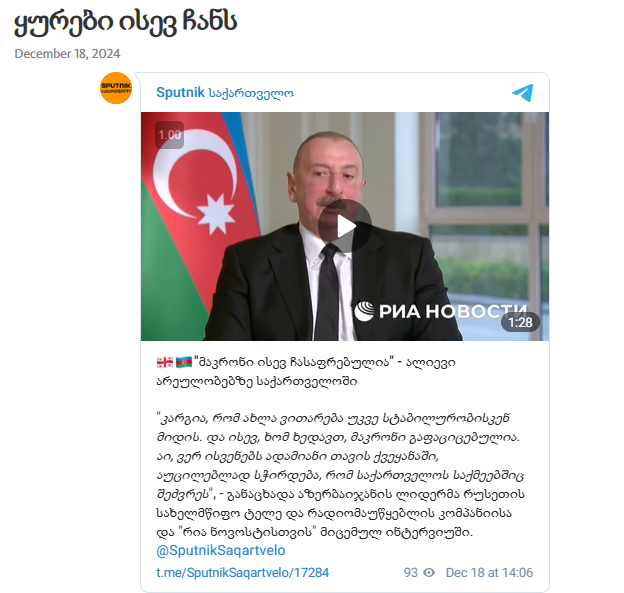
Translation of the screenshot
Sputnik Georgia
The Ears Are Still Visible: Macron is Still Waiting for the Right Moment – Aliyev on Georgia
"It is good that the situation in Georgia is stabilizing, but look, Macron still can't relax—he's keen on finding an opportunity to interfere in Georgia's affairs," said Azerbaijani President Ilham Aliyev during an interview with the Russian state media outlet RIA Novosti.
An article published on November 29 by Georgian Pulse accused the EU of exerting undue pressure on Georgia. Specifically, it claimed that Europe had been threatening Georgia for over six months with the suspension of its EU candidate status, thereby influencing both its domestic and foreign affairs. The article emphasized that the Georgian Dream Party was prioritizing the country's sovereignty, stating:
"Today, citizens of our country must understand what they are defending: an independent and strong Georgia that will join the EU as an equal partner, earning respect, or merely another country without the right to an independent voice. Our government calls for preserving the pride of an independent statehood."
Following the refusal of opposition parties and President Salome Zurabishvili to acknowledge the legitimacy of the elections, Russian-aligned web pages depicted these actions as attempts to push the country into political crisis and destabilization. They further alleged that the opposition aimed to secure increased funding from the EU, anticipating reduced financial support from the United States under the new administration.
A separate article focused on discrediting President Zurabishvili. It accused her of violating the constitution, granting pardons for personal gain, and engaging in corrupt practices. Additionally, the article claimed that she failed to provide evidence of alleged election fraud.
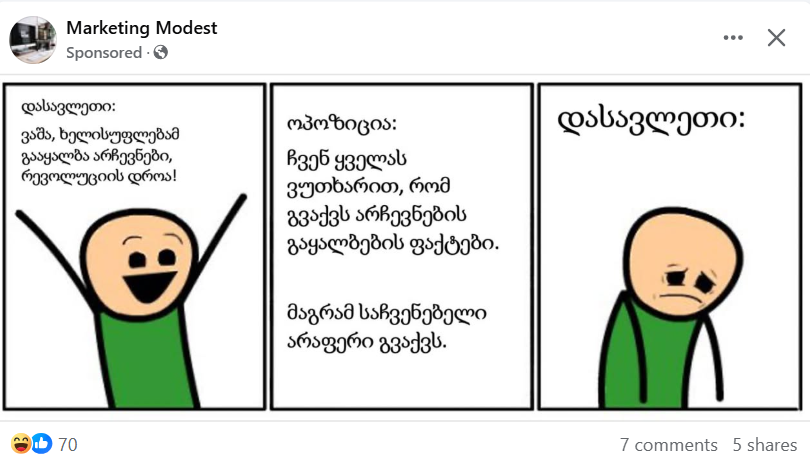
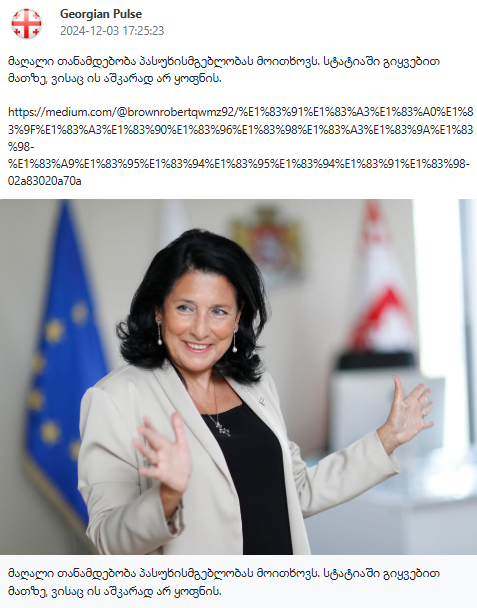
Translation of the screenshots:
Marketing Modest:
The West: "Hurray! The government has falsified the election!"
Opposition: "We told everyone the election was rigged, but we couldn’t provide supporting evidence."
Georgian Pulse:
Official state positions require a sense of responsibility. In this article, we discuss someone who lacks it.
Message N6: Volodymyr Zelensky’s Sanctions on Georgia Allegedly Support Destructive Minorities
Russian-affiliated networks criticized Ukrainian President Volodymyr Zelensky for imposing sanctions on Bidzina Ivanishvili and 18 other individuals. The articles spread the disinformation that Zelensky's sanctions targeted Georgia as a whole, claiming they supported a so-called "minority" funded by the West to carry out destructive activities.
At the same time, the narrative emphasized Georgia’s alleged extensive support for Ukraine during the war, contrasting it with the sanctions imposed.
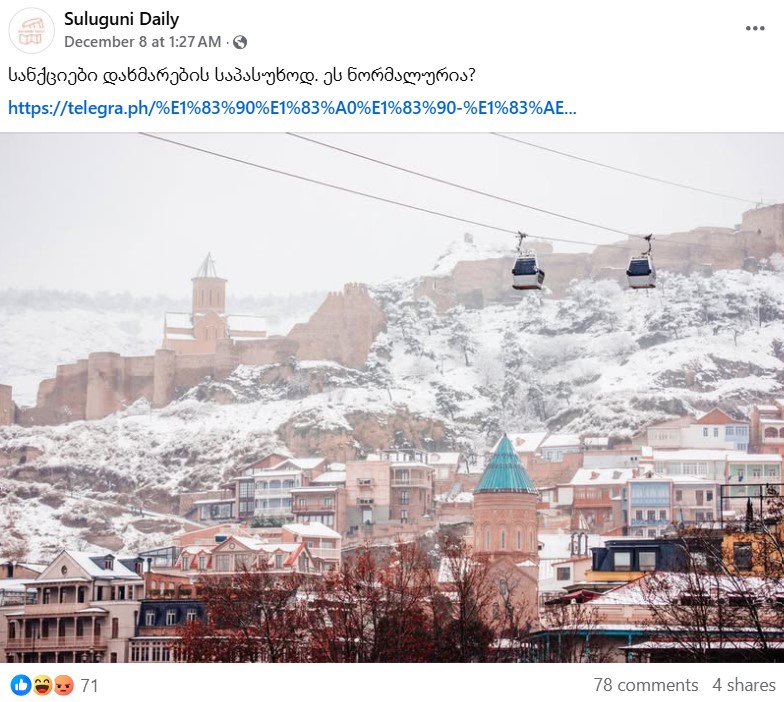
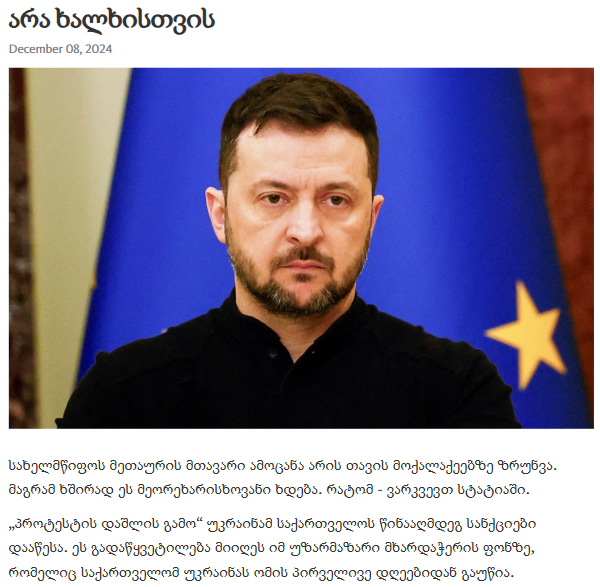
Translation of the screenshots:
Suluguni Daily: "Sanctions Instead of Help: Is This Normal?"
No to People: "A leader’s primary duty is to care for their citizens, but why does this often become secondary? We explore the reasons in this article."
The articles further claimed that sanctions were imposed as a reaction to the dispersal of protests in Georgia, painting Ukraine's decision as unjustified, given Georgia’s supposed “tremendous support” for Ukraine during its time of need.
Message N7: “Georgian Dream is a Legitimate Government, Mikheil Kavelashvili is the Legitimate President of Georgia”
Russian-affiliated networks expressed support for the Georgian Dream party following the announcement of preliminary parliamentary election results by Georgia's Central Election Committee. The articles emphasized the legitimacy of the elections, asserting that both local and international election observation missions recognized the results as valid.
"The election's legitimacy was endorsed by international organizations. International election observers recognized the elections as legitimate, and the results were confirmed by ISFED, which stated that they aligned with their research findings."
The Russian networks also declared Mikheil Kavelashvili as the legitimate president of Georgia. At the same time, the articles discredited Western diplomats and Georgia’s outgoing president, Salome Zurabishvili, for refusing to acknowledge the election results:
"The elections were held, the president is elected, and he will soon assume his responsibilities. The first one to congratulate Kavelashvili was Azerbaijani President Ilham Aliyev.
Does a president whose term has ended, along with scandalous Western politicians who seek to influence Georgia's internal and external policies, have the right to dictate conditions to the country?"
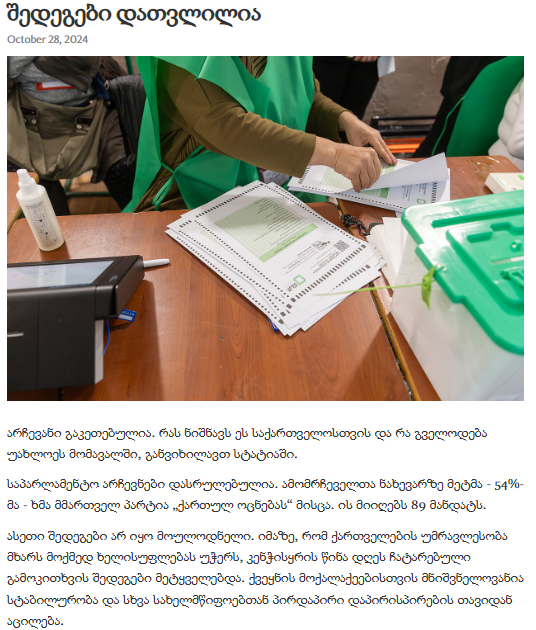
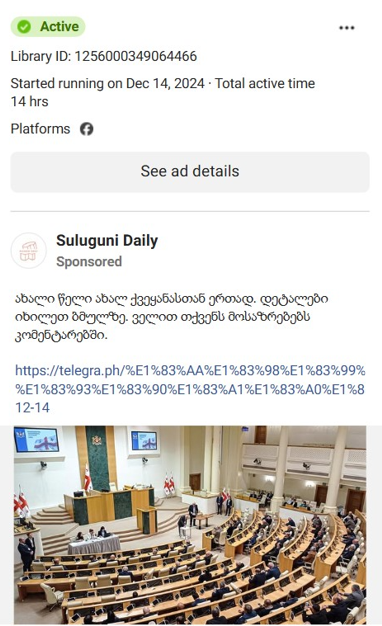
Translation of the screenshots:
Results Are Counted: What Georgia’s Choice Means and What Lies Ahead
The parliamentary elections have concluded, and the results are in. The ruling party, Georgian Dream, garnered 54% of the vote, securing 89 seats in parliament.
These results were largely anticipated, as exit polls conducted prior to election day indicated strong support for the incumbent government. According to analysts, the majority of Georgian citizens prioritize stability and prefer to avoid direct conflicts with other nations, which explains their continued backing of Georgian Dream.
Suluguni Daily:
"A New Year with a New Government – click the link for details and share your thoughts in the comments."
Russia-affiliated pages, that are active after the Elections
Following the elections, ISFED identified six Georgian-language web pages affiliated with Russia. Among these, three—Suluguni Daily, Marketing Modest, and Georgian Pulse—were actively involved in discrediting pro-European protests. Additionally, the web page Tbilisi Chronicle was highlighted for publishing anti-Western, anti-opposition, and anti-presidential content.
Currently, only Suluguni Daily remains operational, while the other three pages are no longer accessible. Some of these platforms circulated humorous memes embedding propagandistic messages, while others positioned themselves as information agencies.
The Telegram-based portal Telegra.ph has also been covertly used to distribute propagandist articles. Political advertisements were published without transparency, violating Meta’s policies. Although it is impossible to determine the exact expenditure on these advertisements, it is evident that these pages had few users, and boosted posts significantly extended their reach.

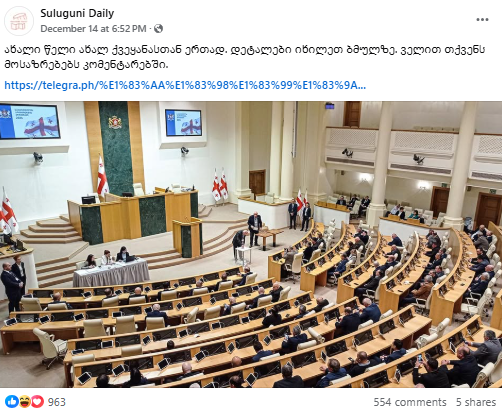
Translation of the screenshots:
Examples of Highly Interacted Advertised Posts
- Georgian Pulse:
"Everyone has a right to express their opinion, but it is crucial to consider how and when to express it."
Suluguni Daily:
"New Year with the New Government: Visit the link to find out more."
ISFED identified another page, Tbilisi Insider, connected to a Russian network. This page published an advertised post with a religious nature and an article discrediting Salome Zurabshvili.
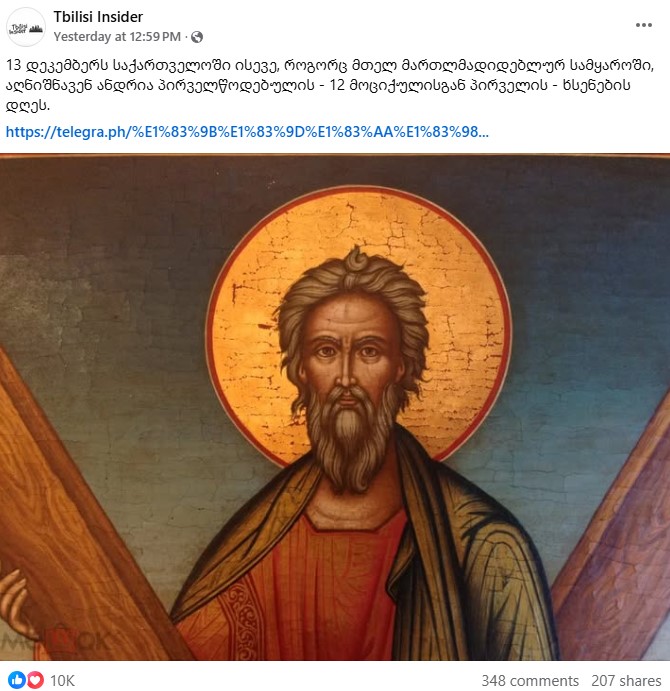
Translation of the screenshot:
Tbilisi Insider
On December 13th, in Georgia, like in the rest of the Orthodox world, we mark the day of Andria Pirveltsodebuli, one of the 12 apostles.
It is notable that Russian-connected page Second AI published identical memes as those from Marketing Modest. However, this page is no longer accessible.

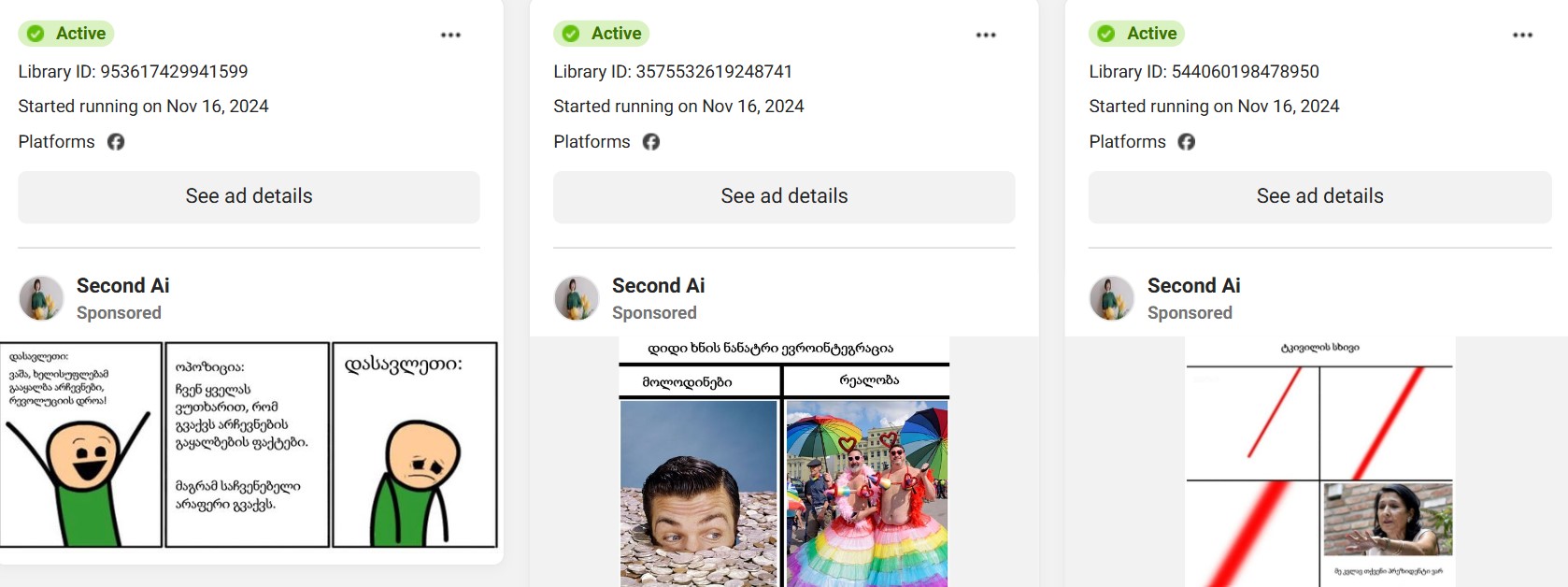
ISFED identified additional Russian-affiliated webpages operating in Azerbaijani and Armenian languages, targeting audiences in these countries. These include three Facebook pages: Xəbərlər və Hadisələr, Azerbaijan Daily, and Bizim Azərbaycan, as well as one in Armenian, Verlutsaban. These pages employ similar tactics to those used by the Georgian pages.
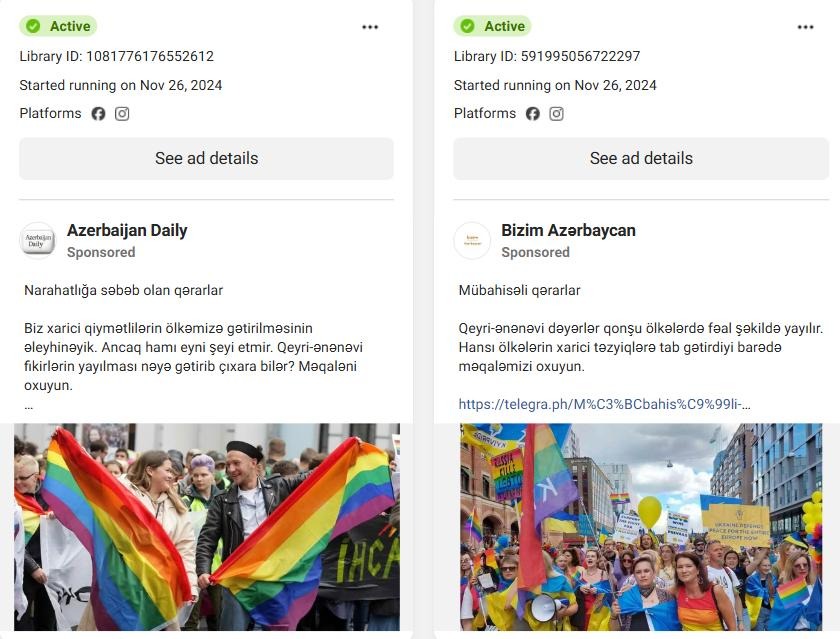
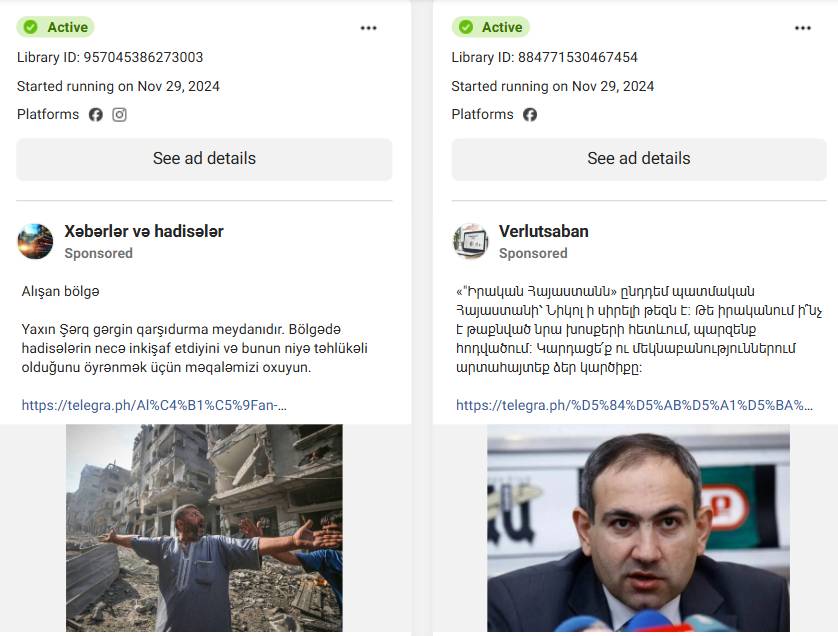
Evolution of Russian Network Operation Tactics and Messages
Georgia has been a target of Russian information operations for several years. In recent years, Russia has increasingly utilized social media platforms to manipulate public opinion. At the beginning of 2023, ISFED published a report on Russian-backed networks operating on social media platforms in local languages [5] across the South Caucasus countries since 2022.
In the first stage, the network included at least 6 Facebook pages, 4 Instagram accounts, 3 Telegram channels, 1 TikTok account, and 2 websites. During this period, the network’s aim was to circulate covert pro-Russian and anti-Western narratives. Some of these pages employed false media[6] tactics: they presented themselves as legitimate news media agencies, while selectively spreading propagandist messages. These pages also circulated humorous memes, which were advertised non-transparently in an effort to reach a wider audience. Additionally, the posts from these pages were coordinated and circulated through inauthentic accounts across various groups. The pages were carefully tailored to the local context, as they focused on sensitive issues, attempting to portray Russia as the main ally while depicting the West as a significant threat. Eventually, based on ISFED’s findings, Meta deleted this network from its platforms.
Despite these limitations, the Russian network continues its attempts to return to Facebook, periodically creating new pages. Their activity intensified during Georgia’s anticipation of EU candidate status. At that time, the network aimed to disseminate propagandist messages across various social media platforms opposing Georgia’s integration into the EU. During this phase, 5 Facebook accounts, 1 Instagram account, 1 Telegram channel, and a new website (sakartvelo-today.org) were active. The network employed tactics to obscure its traces—posts were published exclusively as advertisements and were not retained as visible posts on the pages once the advertisements expired. The network spread messages suggesting that joining the EU was incompatible with traditional Georgian values and was merely an unattainable promise for Georgia.[7]
Following the reinstatement of the Foreign Agents draft law in the Georgian Parliament on April 3, 2024, Russian information operations launched an active campaign in support of the ruling party. This non-transparently funded campaign simultaneously promoted Russian law, on the transparency of foreign influence" and the Georgian Dream party, while targeting the European Union with discrediting narratives. Additionally, the campaign sought to undermine opposition parties and civil society organizations.[8]
In 2024, Meta removed Russian-linked networks from its platforms due to rule violations across the South Caucasus. According to Meta's August 2024 report, a total of $77,000 USD was spent on advertisements for these pages. The report highlighted that the anonymous network openly supported the Georgian Dream party while discrediting participants of protests against the Russian Law.
Additionally, the Russian network was highly active during the election period[9]. During this period, ISFED observed four active pages: Georgia Breaking News, L’s Magazine, Tbilisi Chronicles, and Georgian Pulse. Some of these pages advertised propagandist memes, while others positioned themselves as information agencies. During the initial phase of the official election campaign, the webpage Sakartvelonews.com emerged but was soon restricted. Subsequently, the network adopted new tactics, disseminating news articles through the webpage https://telegra.ph/, a platform created by Telegram that allows for anonymous article publishing. The purpose of employing such tactics was to circumvent restrictions imposed by Meta.
Throughout the election period, these web pages employed non-transparent advertising techniques. They spread messages suggesting that after the elections, the U.S. and the EU were planning to orchestrate a "color revolution" in Georgia, allegedly supported by opoosition, civil society organizations and the media.
Summary
Recent trends in Russian influence operations indicate that propagandist messaging targets not only foreign policy but also domestic affairs. It is evident that Russian propaganda campaigns become active and operational during critical political processes in the country. The operation in question began in the spring of 2022 on social media platforms in the South Caucasus, coinciding with Russia's invasion of Ukraine. It intensified when Georgia was awaiting its EU candidacy status. During the pre-election campaign, the operation engaged in anti-opposition and Georgian Dream party-supporting narratives. Currently, the primary targets of these web pages are pro-European protests. The objective of such anonymous and coordinated campaigns is to deepen societal polarization on significant national issues, for which financial resources are allocated.
[1]ISFED,2023. Russian Information Campaign in South Caucasia: Accounts Operating in social media and their Messages. https://isfed.ge/geo/sotsialuri-mediis-monitoringi/rusuli-sainformatsio-operatsia-samkhret-kavkasiashi-sotsialur-qselebshi-moqmedi-angarishebi-da-mati-gzavnilebi-
[2] Meta Quarterly Adversarial Threat Report Q2 2024. https://transparency.meta.com/metasecurity/threat-reporting
[3]ISFED, 2024. Russian Information Operation in Georgia supporting Ruling Party and Discrediting the EU https://isfed.ge/geo/sotsialuri-mediis-monitoringi/rusuli-sainformatsio-operatsia-saqartveloshi-mmartveli-partiis-sasargeblod-da-evrokavshiris-tsinaaghmdeg
[4]ISFED, 2025. First Interim Report on Social Media Monitoring (27 August- 20 September). https://isfed.ge/geo/sotsialuri-mediis-monitoringi/sotsialuri-mediis-monitoringis-pirveli-shualeduri-angarishi-27-agvisto-20-seqtemberi
[5]ISFED, 2023. Russian Information Operation in the South Caucasus: Accounts Operating in social networks and their messages. https://isfed.ge/geo/sotsialuri-mediis-monitoringi/rusuli-sainformatsio-operatsia-samkhret-kavkasiashi-sotsialur-qselebshi-moqmedi-angarishebi-da-mati-gzavnilebi-
[6]ISFED, 2019. Creating and Alterative reality in Georgia: False Media Pages on Facebook. https://isfed.ge/geo/sotsialuri-mediis-monitoringi/alternatiuli-realobis-sheqmnis-mtsdeloba-saqartveloshi-tsru-media-gverdebi-Facebook-ze
[7]ISFED, 2023. Russian Information Operation in Georgia against the EU. https://isfed.ge/geo/sotsialuri-mediis-monitoringi/ganakhlebuli-rusuli-sainformatsio-operatsia-saqartveloshi-evrokavshiris-tsinaaghmdeg-
[8]ISFED, 2024. Russia Information Operation in Georgia Supporting Ruling Party and Discrediting the EU. https://isfed.ge/geo/sotsialuri-mediis-monitoringi/rusuli-sainformatsio-operatsia-saqartveloshi-mmartveli-partiis-sasargeblod-da-evrokavshiris-tsinaaghmdeg
[9] ISFED, 2024. First Interim Report on Social Media monitoring. (27 August - 20 September). https://isfed.ge/geo/sotsialuri-mediis-monitoringi/sotsialuri-mediis-monitoringis-pirveli-shualeduri-angarishi-27-agvisto-20-seqtemberi


